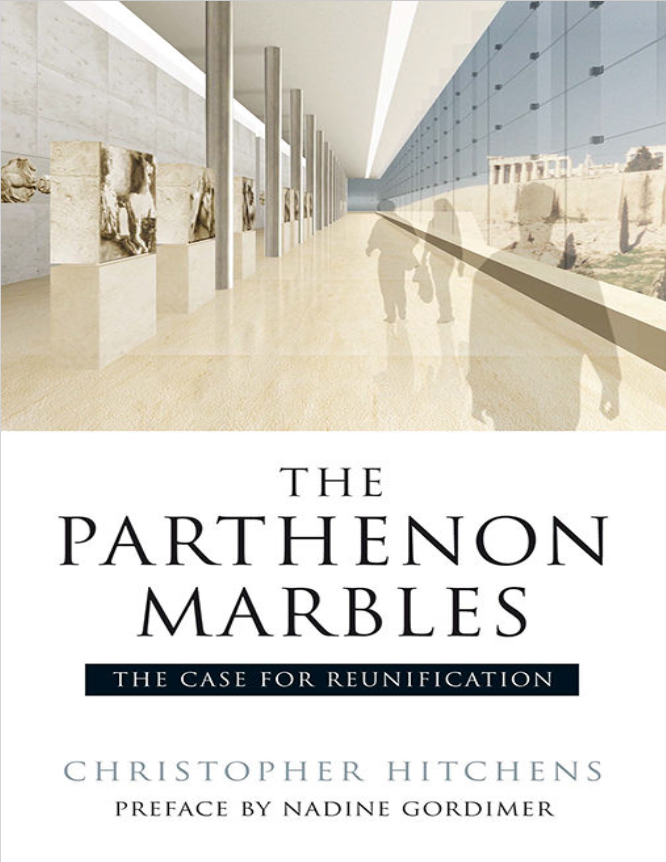Newly released
This book is new and will be uploaded as soon as it becomes available to us and if we secure the necessary publishing rights.

The Parthenon Marbles Book PDF
(0)
Author:
Christopher HitchensNumber Of Reads:
63
Language:
English
Category:
fieldsSection:
Pages:
213
Quality:
excellent
Views:
756
Quate
Review
Save
Share
Book Description
The Parthenon Marbles: The Case for Reunification (The most powerful case yet made for the return of the Parthenon Marbles)
The Parthenon Marbles (formerly known as the Elgin Marbles), designed and executed by Pheidias to adorn the Parthenon, are perhaps the greatest of all classical sculptures. In 1801, Lord Elgin, then ambassador to the Turkish government, had chunks of the frieze sawn off and shipped to England, where they were subsequently seized by Parliament and sold to the British Museum to help pay off his debts.
This scandal, exacerbated by the inept handling of the sculptures by their self-appointed guardians, remains unresolved to this day. In his fierce, eloquent account of a shameful piece of British imperial history, Christopher Hitchens makes the moral, artistic, legal and political case for re-unifying the Parthenon frieze in Athens.
The opening of the New Acropolis Museum emphatically trumps the British Museum’s long-standing (if always questionable) objection that there is nowhere in Athens to house the Parthenon Marbles. With contributions by Nadine Gordimer and Professor Charalambos Bouras, The Parthenon Marbles will surely end all arguments about where these great treasures belong, and help bring a two-centuries-old disgrace to a just conclusion.
Christopher Hitchens
He is a British-American author, columnist, essayist, orator, literary and religious critic, social critic and journalist. Hitchens was the author, co-author, editor or co-editor of more than 30 books, including five collections of political, cultural, and literary essays. His polemical rhetoric made him a central topic of public discourse, resulting in him as an intellectual and controversial figure. Contributed to New Statesman, The Nation, The Weekly Standard, The Atlantic, London Review of Books, The Times Literary Supplement, Slate, Free Inquiry, and Vanity Fair. Describing himself as a democratic socialist, Marxist and anti-totalitarian, he broke with the political left after describing it as the "lukewarm reaction" of the Western left to the debate over The Satanic Verses, followed by the left's embrace of Bill Clinton and the anti-NATO war movement in Bosnia and Herzegovina in the 1990s.
The last century. His support for the war on Iraq further separated him. His writings included criticism of public figures such as Bill Clinton, Henry Kissinger, Mother Teresa and Diana, Princess of Wales. He was the older brother of conservative journalist and author Peter Hitchens. He also called for the separation of church and state. As a critic of divinity, he regards notions of a deity or a higher power as universalistic beliefs that restrict individual freedom. He advocated freedom of expression and scientific discovery, and that it trumps religion as a moral code of conduct for human civilization. His famous statement, "What can be affirmed without evidence can be denied without evidence" became known as the Hitchens Code.
Book Currently Unavailable
This book is currently unavailable for publication. We obtained it under a Creative Commons license, but the author or publisher has not granted permission to publish it.
Rate Now
5 Stars
4 Stars
3 Stars
2 Stars
1 Stars
The Parthenon Marbles Quotes
Top Rated
Latest
Quate
Be the first to leave a quote and earn 10 points
instead of 3
Comments
Be the first to leave a comment and earn 5 points
instead of 3